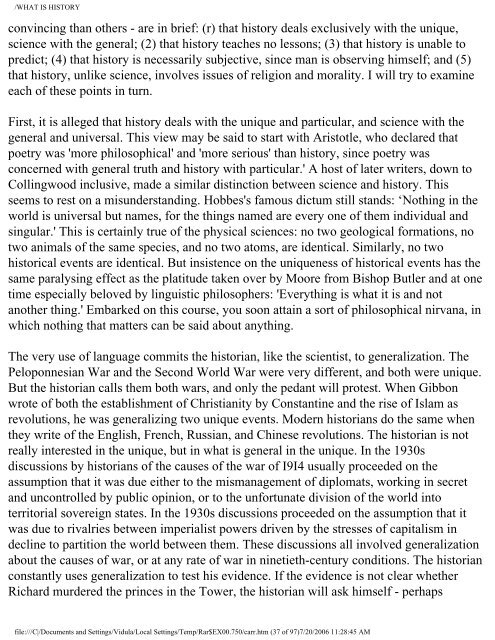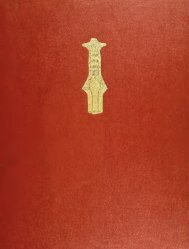What is History / by Edward Hallett Carr - Universal History Library
What is History / by Edward Hallett Carr - Universal History Library
What is History / by Edward Hallett Carr - Universal History Library
Create successful ePaper yourself
Turn your PDF publications into a flip-book with our unique Google optimized e-Paper software.
WHAT IS HISTORY<br />
convincing than others - are in brief: (r) that h<strong>is</strong>tory deals exclusively with the unique,<br />
science with the general; (2) that h<strong>is</strong>tory teaches no lessons; (3) that h<strong>is</strong>tory <strong>is</strong> unable to<br />
predict; (4) that h<strong>is</strong>tory <strong>is</strong> necessarily subjective, since man <strong>is</strong> observing himself; and (5)<br />
that h<strong>is</strong>tory, unlike science, involves <strong>is</strong>sues of religion and morality. I will try to examine<br />
each of these points in turn.<br />
First, it <strong>is</strong> alleged that h<strong>is</strong>tory deals with the unique and particular, and science with the<br />
general and universal. Th<strong>is</strong> view may be said to start with Ar<strong>is</strong>totle, who declared that<br />
poetry was 'more philosophical' and 'more serious' than h<strong>is</strong>tory, since poetry was<br />
concerned with general truth and h<strong>is</strong>tory with particular.' A host of later writers, down to<br />
Collingwood inclusive, made a similar d<strong>is</strong>tinction between science and h<strong>is</strong>tory. Th<strong>is</strong><br />
seems to rest on a m<strong>is</strong>understanding. Hobbes's famous dictum still stands: ‘Nothing in the<br />
world <strong>is</strong> universal but names, for the things named are every one of them individual and<br />
singular.' Th<strong>is</strong> <strong>is</strong> certainly true of the physical sciences: no two geological formations, no<br />
two animals of the same species, and no two atoms, are identical. Similarly, no two<br />
h<strong>is</strong>torical events are identical. But ins<strong>is</strong>tence on the uniqueness of h<strong>is</strong>torical events has the<br />
same paralysing effect as the platitude taken over <strong>by</strong> Moore from B<strong>is</strong>hop Butler and at one<br />
time especially beloved <strong>by</strong> lingu<strong>is</strong>tic philosophers: 'Everything <strong>is</strong> what it <strong>is</strong> and not<br />
another thing.' Embarked on th<strong>is</strong> course, you soon attain a sort of philosophical nirvana, in<br />
which nothing that matters can be said about anything.<br />
The very use of language commits the h<strong>is</strong>torian, like the scient<strong>is</strong>t, to generalization. The<br />
Peloponnesian War and the Second World War were very different, and both were unique.<br />
But the h<strong>is</strong>torian calls them both wars, and only the pedant will protest. When Gibbon<br />
wrote of both the establ<strong>is</strong>hment of Chr<strong>is</strong>tianity <strong>by</strong> Constantine and the r<strong>is</strong>e of Islam as<br />
revolutions, he was generalizing two unique events. Modern h<strong>is</strong>torians do the same when<br />
they write of the Engl<strong>is</strong>h, French, Russian, and Chinese revolutions. The h<strong>is</strong>torian <strong>is</strong> not<br />
really interested in the unique, but in what <strong>is</strong> general in the unique. In the 1930s<br />
d<strong>is</strong>cussions <strong>by</strong> h<strong>is</strong>torians of the causes of the war of I9I4 usually proceeded on the<br />
assumption that it was due either to the m<strong>is</strong>management of diplomats, working in secret<br />
and uncontrolled <strong>by</strong> public opinion, or to the unfortunate div<strong>is</strong>ion of the world into<br />
territorial sovereign states. In the 1930s d<strong>is</strong>cussions proceeded on the assumption that it<br />
was due to rivalries between imperial<strong>is</strong>t powers driven <strong>by</strong> the stresses of capital<strong>is</strong>m in<br />
decline to partition the world between them. These d<strong>is</strong>cussions all involved generalization<br />
about the causes of war, or at any rate of war in ninetieth-century conditions. The h<strong>is</strong>torian<br />
constantly uses generalization to test h<strong>is</strong> evidence. If the evidence <strong>is</strong> not clear whether<br />
Richard murdered the princes in the Tower, the h<strong>is</strong>torian will ask himself - perhaps<br />
file:///C|/Documents and Settings/Vidula/Local Settings/Temp/Rar$EX00.750/carr.htm (37 of 97)7/20/2006 11:28:45 AM







